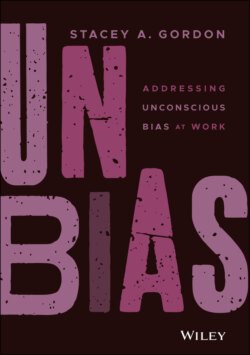Читать книгу UNBIAS - Stacey A. Gordon - Страница 21
Unconscious Bias Is a Complex Issue: Defining Your Why
ОглавлениеOne of the reasons addressing diversity, inclusion, and unconscious bias at work can seem difficult is that it is usually a complex problem. You don't normally have one straightforward issue to be resolved. There is nuance and it is multifaceted, which makes you have to work a little harder to unravel it all. It is necessary to tackle both the lack of diversity and the lack of “why,” and the process can be complex. However, complex does not automatically equate to difficult.
When a company is unable to discern why diversity and inclusion training is a priority for them, the default answer is often “to avoid bad publicity.” If we look at the Black Lives Matter movement as an example, your company might be one of the many who published a statement of support for George Floyd and told everyone that “Black Lives Matter” in an attempt to avoid being put on the list of companies to boycott. Maintaining good optics is not a “why.” It is inauthentic, not actionable, and your consumers, clients, and employees see right through it.
Numerous statistics indicate the positive financial impact of diversity and inclusion on the workplace. Companies that are inclusive are more likely to lead and capture new markets, 43% of companies with diverse management exhibited higher profits, companies with racial and ethnical diversity are 35% more likely to perform at a higher level, and companies with an equal number of men and women produce up to 41% higher revenues.
It's no wonder that in the absence of a why, the default answer is “to make money,” and we assume because we need to make money and our clients won't work with someone who doesn't look like them, that there is nothing that can be done about the lack of diversity. We throw up our hands and say that it is what it is. Yet when you have a true “why,” making money becomes a happy by‐product. A company that truly understands this concept is Vans, the footwear company. When a call was made to support Black‐owned businesses, they made it difficult to purchase anything on their website that day. On July 7, 2020, Vans posted the following statement on their website:
A NEW PAIR OF VANS CAN WAIT.
Today is Blackout Day, so before you spend money on our site, we ask that you consider shopping with your favorite Black‐owned businesses or donating to organizations such as the NAACP, GSA Network, and Color of Change. Learn more about what we are doing to support Black Lives Matter and racial equality.
The statement wasn't in a corner of their website. It wasn't a banner at the top or a footnote at the bottom. That statement was the only thing you saw if you visited their page that day.
